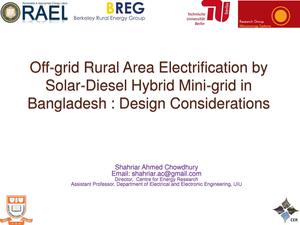Off-grid Rural Area Electrification by Solar-Diesel Hybrid Mini-grid in Bangladesh: Design Considerations
From energypedia
Off-grid Rural Area Electrification by Solar-Diesel Hybrid Mini-grid in Bangladesh: Design Considerations
Presenter: Shahriar Ahmed Chowdury, (Center for Energy Research, United International University)
Rapporteur: Katie McCloskey
Overview
| Bangladesh is experiencing the most successful solar home system based rural electrification program. So far the program has installed more than 3 million SHS in rural areas of Bangladesh. The SHS can provide electricity to rural areas for 4 to 5 hours to operate basic loads like lighting, mobile phone charging, B/W TV etc. The SHS can hardly contribute to productive commercial activities in rural off grid areas. In the rural areas loads are sparsely distributed and demand of energy is at a barely minimum. So, it is not economically viable to extend the national grid to the remote off grid areas. Also in the island areas the grid extension is not economically feasible. Electricity access in rural Bangladesh is less than 40%. It is the common tendency of the rural people to live in clustered households. These paved the options for electrification of off grid areas with small standalone solar PV mini-grids, considering that Bangladesh has moderate solar insolation. One of the challenges of developing mini-grids is the storage system management. Incorporation of a small diesel generator not only reduces the requirement of storage system but can also provide energy in low insolation days, thus reduces the requirement of autonomy days. This paper highlights the technical design consideration for developing solar-diesel hybrid mini-grids in off grid rural areas of Bangladesh[1]. |
Issues Presented
► Please see the presentation.
- Battery management has proven to be the most important part of the Solar-diesel hybrid mini-grid project
- Emphasize potential for daytime load increase (does not require storage) by shutting down feeders during night time
- IDCOL- provides funding for development of mini-grids in Bangladesh. 50% is grant, loan and smallest portion is equity: financial model designed for 20 years
- Household conditioni s surveyed before the project (feasibility study)
- For 800 households: the financial model does not look good enough for the demand because the majority of the demand is at night. The cost of electricity is almost 3 times higher if use electricity at night than in the day
- Battery management: life, charging and discharging, duty (kept it at about 50%)
- Keep diesel generator as a backup and to make up the rest of the hours that are not generated by PV
- During winter the day demand reduces because of electric fund. But irrigation demand. 10-15 irrigation plants integrated in the winter season can make up for the lack of demand (compared to summer)- reduces the cost of energy
- Most costly is the storage system of the project
- Advantage of diesel- battery very small- do not use it for night storage
- 17 kw power can be handled by 1 inverter
- Small households have one room and one toilet
- Largest pack –of consumers-school
- Solar irrigation- irrigation farms only operate during daytime- installed separate feeders- energy started with light and shut off with sunset
- Need management people for any type of system and about the same number
Q & A
- Comment: Understanding the local dynamics is of critical importance. You must design a system that fits the local needs.
References
- ↑ Off-grid Rural Area Electrification by Solar-Diesel Hybrid Mini-grid in Bangladesh: Design Considerations. Shahriar Ahmed Chowdhury and Shakila Aziz.





















